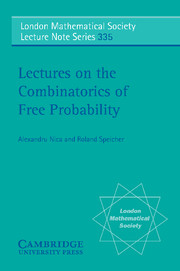Book contents
- Frontmatter
- Contents
- Introduction
- Part 1 Basic concepts
- Part 2 Cumulants
- Lecture 8 Motivation: free central limit theorem
- Lecture 9 Basic combinatorics I: non-crossing partitions
- Lecture 10 Basic combinatorics II: Möbius inversion
- Lecture 11 Free cumulants: definition and basic properties
- Lecture 12 Sums of free random variables
- Lecture 13 More about limit theorems and infinitely divisible distributions
- Lecture 14 Products of free random variables
- Lecture 15 R-diagonal elements
- Part 3 Transforms and models
- Notes and comments
- References
- Index
Lecture 12 - Sums of free random variables
Published online by Cambridge University Press: 06 July 2010
- Frontmatter
- Contents
- Introduction
- Part 1 Basic concepts
- Part 2 Cumulants
- Lecture 8 Motivation: free central limit theorem
- Lecture 9 Basic combinatorics I: non-crossing partitions
- Lecture 10 Basic combinatorics II: Möbius inversion
- Lecture 11 Free cumulants: definition and basic properties
- Lecture 12 Sums of free random variables
- Lecture 13 More about limit theorems and infinitely divisible distributions
- Lecture 14 Products of free random variables
- Lecture 15 R-diagonal elements
- Part 3 Transforms and models
- Notes and comments
- References
- Index
Summary
Our main concern in this lecture will be the understanding and effective description of the sum of freely independent random variables. How can we calculate the distribution of a + b if a and b are free and if we know the distribution of a and the distribution of b. Of particular interest is the case of selfadjoint random variables x and y in a C*-probability space. In this case their distributions can be identified with probability measures on ℝ and thus taking the sum of free random variables gives rise to a binary operation on probability measures on ℝ. We will call this operation “free convolution,” in analogy with the usual concept of convolution of probability measures which corresponds to taking the sum of classically independent random variables. Our combinatorial approach to free probability theory, resting on the notion of free cumulants, will give us very easy access to the main results of Voiculescu on this free convolution via the so-called “R-transform.”
Free convolution
Definition 12.1. Let μ and ν be probability measures on ℝ with compact support. Let x and y be selfadjoint random variables in some C*-probability space such that x has distribution μ, y has distribution ν, and such that x and y are freely independent. Then the distribution of the sum x + y is called the free convolution of μ and μ and is denoted by μ ⊞ ν.
- Type
- Chapter
- Information
- Lectures on the Combinatorics of Free Probability , pp. 195 - 210Publisher: Cambridge University PressPrint publication year: 2006

